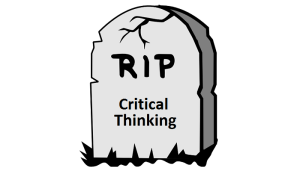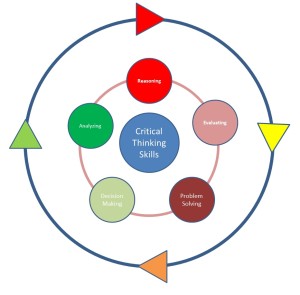Information technology has and is simplifying the work we do. The way we collect data, analyze it and communicate it is becoming easier every day. Social media such as Facebook, Twitter and other sites have facilitated communication by overcoming distance as a barrier to information conveyance. Therefore, it is easier to gather ideas and views from many people in all corners of the world, the new global village. An individual in the western part of the world is able to get real-time information from another one in the eastern part. The Internet being an essential infrastructure through which the two sides interact. So let’s discuss the impact of technology on the upcoming generation about how they think and the adverse effects of technology on critical thinking, reasoning and decision making of people in this era.
Social media in general is impacting how Millennials and Gen Y’ers are communicating. Over time new social media sites emerge. People in their teens and twenties spend much of their time online seeking solutions to their problems. Therefore, they lose touch with basic one on one communication. Consultation is done through the internet involving the friends one has online. Overreliance on search engines and social media for solutions is occupying the position that critical thinking formerly possessed. A person having a particular challenge is comfortable seeking the solution through Facebook, Twitter, Reddit and other common sites which combine the thoughts of others to a solution that they present as their own. Acquiring those ideas/opinions from people is deleterious to their very own critical thinking ability. Thinking is important because it connects feeling with what one hears. In this generation, conversations on social media use the “emoji” (Japanese for “picture word”) as a representation of feelings. While cute, it is highly unlikely that these small icons provide an effective representation of human feelings and their continued use is leading to the disconnect between thoughts and feelings, such as worry, happiness, anger and even laughter. They are not capable of showing our sentiments to the fullest. Instead, they are just a poor representation of emotion.
In these upcoming generations, recalling relevant information and using critical thinking skills is becoming less apparent. Search engines such as Google have simplified how we search for information. All one needs to have is a few keywords and the results appear in seconds. The need to draw from “learned information” is virtually nil with so many databases from which to draw upon. Therefore the capacity to remember important details declines with improvement in the information technology and therefore facilitates a generation of researchers and not thinkers. It should come as no surprise that when pressed to speak publicly a millennial may be found to lack the ability to express his/her thoughts when addressing an audience. The reason likely is the inability to connect one data point to the next in a stream of consciousness without the crutch of a search engine or online resource. The basic inability to understand the relevance of the bigger picture and string a set of thoughts together.
If you were to get a millennial in a room with no smartphone, computer or wi-fi and ask them “If you travel by train from New York to Boston how many railroad ties will you pass over on your trip?” you may find that you won’t likely get an answer because they lack the critical thinking skills, or the mere memorization of facts to even hazard a guess. Yet give them a computer and let them “Google It” they may come up with an answer based on information someone else says is true. Information acquisition from the search engines does not mean that the finding is accurate or precise, but just providing what is widely acceptable as a “good enough answer”. Websites like Snopes.com created an entire industry around dispelling the ridiculous and sometime believable snippets of data that pop up on social media. To this day my 21 year old daughter still believes that September 11th (9/11) was a government cover up because of what she read on the Internet.
Knowledge provides a ground work for critical thinking and critiquing the findings of other people and not just blindly accepting their claims at face value. In this digital generation, knowledge and wisdom are rare because everyone want to have the shortcut that would lead to his or her problem being solved. Personal opinions do not count anymore as compared to what other people say or think. Developing analysis of a challenge is facing the problem of impatience and lack of self-esteem. Time is becoming a very scarce resource in that reading a 500-page book is becoming impossible because many people get preoccupied with other online activities. A potential millennial reader would rather read a book review on the internet rather than read the actual book. Moreover, because thinking encompasses creating an image in our mind, they end up missing on a specific segment of the book. Take for example a non-fiction book, the key to really appreciating it is the times when you stop reading and digest what you have just read and try and understand what information was trying to be conveyed or what the main character was trying to accomplish.
A very apropos acronym used online more often these days is “tl;dr” which is a shorthand notation added by a reader during an online discussion indicating a passage appeared to be too long to invest the time to digest. (too long, didn’t read) now when you take a step back and realize that you see this in response to maybe a 150 word message, it is indicative of the fact that the upcoming generations not only lacks critical thinking skills, they also lack patience or interest in participating in a discussion that requires them to read anything longer than a “tweet”
Moral erosion can be another unintended outcome. Thinking involves asking whether something is good or evil or capable of causing harm to us. This part of thinking is important and of value to humanity. This aspect seems absent in the minds of “20 somethings. Consequently, most people are engaging themselves in activities they see others do without assessing the outcomes. They also seem to lack the capabilities to think ahead several steps. “If I do this, then this could happen, which will result in this……” An individual would rather experiment than referring to similar happenings in the past. At the end one regrets the things they did or did not do.
Technology is essential to the human being but misusing it becomes deleterious to us and the way we think. Spending too much time surfing the net is discouraging the desire to analyze and process data. An example is an inability to do simple calculations that do not need computation, perhaps not taking out your phone to calculate a 15% tip on a dinner bill? If this trend continues, decision making and critical thinking will become a thing of the past and those that chose to engage and master it will be the outliers and potentially the leaders of the future.
About the Author
Joseph Venturelli earned his degree in design from the School of Visual Arts in New York City. His debut into Information Technology in healthcare began as a system administrator, concentrating on the technical oversight of information systems at Presbyterian Hospital in Charlotte, North Carolina in 1990. Early on Joseph trained and became certified as a system engineer and certified trainer. He has been responsible for leading teams of technologists including infrastructure, web services, data center operations, call centers, disaster recovery planning and help desk services, and has managed scores of system implementations over the past twenty five years..
Joseph co-led the creation and implementation of an electronic medical record system, which included full financial, transcription and scheduling integration. Physicians were given office access to the scheduling and clinical documentation platforms. This integration strategy created immediate medical record completion, eliminating the need for back end inspection and rework resources. Joseph has consistently delivered efficiencies through standardization, recruiting and retaining key talent and launching enthusiastic customer service programs for a variety of professionals, patients and vendors.
Joseph has been published in numerous technical journals and industry magazines and has authored several books including one on patient advocacy. A seasoned executive, Joseph has worked as the Chief Executive Officer for a Southeast Consulting firm, a Chief Information Officer for an Ambulatory Surgery Center company as well as the Chief Information Officer for a Midwest county hospital system and as the Chief Technology Officer for a New England Hospital System.


Recent Comments